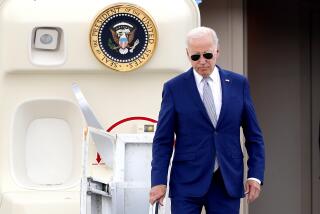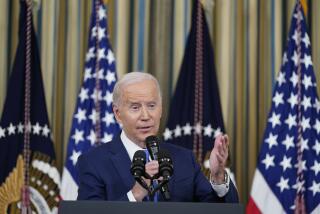Bush Swipes at Iraq Critics on Way to Asia
- Share via
KYOTO, Japan — With his approval ratings slipping at home, President Bush on Monday flew overseas for the second time this month -- but not before taking a parting shot at critics of his Iraq policy.
Bush, who arrives in Japan this morning for a four-nation Asia swing, used a refueling stop in Alaska to accuse Democrats of “playing politics” in their accusations that the White House manipulated intelligence to justify the 2003 invasion of Iraq.
He recited old quotes from three senior Senate Democrats -- John D. Rockefeller IV of West Virginia, Carl Levin of Michigan and Harry Reid of Nevada -- without identifying any of them by name in his remarks. All three backed the war in 2001 and 2002 but have recently led the criticism that the White House misled the public when it tied Iraq to Al Qaeda and said that Saddam Hussein’s regime had pursued nuclear weapons.
“Here’s another quote from a senior Democrat leader: ‘Saddam Hussein, in effect, thumbed his nose at the world community. And I think that the president’s approaching this in the right fashion,’ ” Bush told U.S. airmen at Elmendorf Air Force Base near Anchorage.
“They spoke the truth then and they’re speaking politics now,” the president said as the audience cheered.
Bush’s remarks reflected a new offensive by the White House to stem sagging public support resulting from a growing impression that the administration misled the public in the months before going to war.
Public skepticism has grown since a senior White House official was charged with perjury, obstruction of justice and making false statements as part of an inquiry into the public identification of a CIA official whose husband emerged as an early critic of the administration’s use of intelligence.
In Veterans Day remarks last week, Bush singled out his 2004 reelection challenger, Sen. John F. Kerry (D-Mass.), for shifting his stance on the war. Kerry responded Monday with a fiery speech on the Senate floor, suggesting the president has failed to grasp that the chorus of criticism over his Iraq policy does not consist of Democrats alone.
“Does the president think that the many generals, former top administration officials and senators from his own party who have joined over two-thirds of the country in questioning the president’s handling of the war in Iraq are all unpatriotic too?” Kerry asked. “The president does not have a monopoly on patriotism, and this is not a country where only those who agree with him support the troops and care about defending our country.”
The drumbeat of criticism over Bush’s Iraq policy has grown louder since the indictment last month of I. Lewis “Scooter” Libby, Vice President Cheney’s chief of staff and one of the most vocal White House advocates for the invasion. Democrats had hoped that the investigation of the CIA leak would reignite a national debate over the intelligence that led to war and accused Senate Republicans of delaying a separate inquiry into whether the administration pressured intelligence analysts to conclude that Iraq had pursued chemical, biological and nuclear weapons.
Reid angered Republicans this month by forcing a rare closed session of the Senate to pressure the GOP leadership into concluding that investigation.
White House officials point to other inquiries that found no evidence of administration pressure, including a report by a White House commission headed by retired federal Judge Laurence H. Silberman, a Republican, and former Virginia Gov. and Sen. Charles S. Robb, a Democrat. Instead, the administration maintains that the president and the public were guided by the same faulty intelligence.
Still, speaking to reporters last week, national security advisor Stephen Hadley acknowledged that the White House could have done a better job in making alternative views available to the president.
“What comes into the Oval Office, again, is an effort to provide a consensus judgment,” Hadley said. “But I think one of the things we’ve all learned from that is that it is important, also, to be clear about dissenting opinions and make sure that dissenting opinions also are given visibility.”
The president, meanwhile, will put the Iraq debate on the back burner during his visits to Japan, South Korea, China and Mongolia.
He is not expected to encounter the anti-American protests that greeted him in Argentina two weeks ago, but Asia is full of its own pitfalls for the president’s foreign policy agenda.
The nuclear ambitions of North Korea -- which Bush famously included in his “axis of evil” in 2002 -- will probably be a prime topic later this week at the Asia-Pacific Economic Conference in Pusan, South Korea. Other topics include preparations for a flu pandemic, the Japanese ban on U.S. beef, and the presence of U.S. military forces in the region.
Bush is facing pressure from some critics to take a harder line with China on human rights abuses. The president last week described the U.S. relationship with the communist nation as “complex,” a reference to his efforts to balance China’s growing economic and military power with its political system that runs counter to Bush’s goal of spreading democracy.
Reid, the Senate minority leader, sent a letter Monday accusing the administration of pursuing an “ad hoc, inconsistent and essentially aimless” policy on China.
Although Bush’s eight-day trip gives the president a pre-Thanksgiving respite from an unpleasant time in Washington, administration officials said they did not expect much of substance to be accomplished.
Hadley, speaking to reporters Monday aboard Air Force One, said: “I don’t think there are going to be any headline breakthroughs.”
More to Read
Get the L.A. Times Politics newsletter
Deeply reported insights into legislation, politics and policy from Sacramento, Washington and beyond. In your inbox twice per week.
You may occasionally receive promotional content from the Los Angeles Times.










